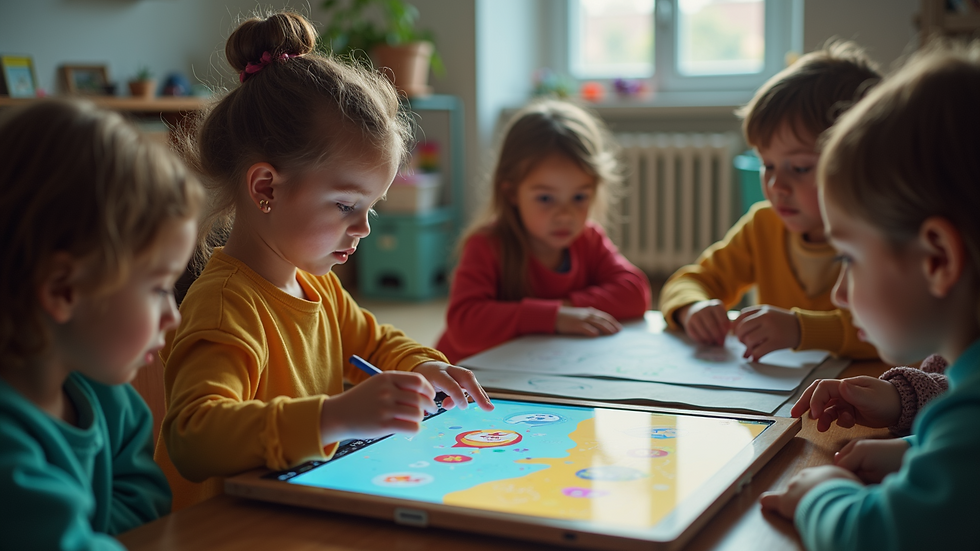Unlocking the Power of Early Language Learning for Children
- littlevinesdaynurs
- Jun 28, 2025
- 3 min read
In a world that is becoming increasingly interconnected, the importance of language learning for children cannot be overstated. Early exposure to languages can open many doors, enabling children to communicate more effectively, develop cognitive skills, and understand different cultures. This blog post explores the significance of early language learning, the developmental benefits it brings, and actionable steps for parents and educators to foster a rich linguistic environment for children.
Language Learning for Children: An Overview
Language learning at a young age offers myriad benefits. Research indicates that children who engage in language learning early on have better listening skills, enhanced memory, and improved problem-solving abilities. For instance, bilingual children often outperform their monolingual peers in tasks that require mental flexibility and multitasking.
One of the most significant advantages is the ability to learn and adapt. The critical period hypothesis suggests that children are particularly receptive to language during their early years. This means that introducing a second language before the age of 7 can lead to a more natural and fluent acquisition of that language. As such, parents and educators should encourage early language exposure in fun and engaging ways.

The Benefits of Early Language Acquisition
Early language acquisition has significant cognitive, social, and emotional benefits. Children who learn multiple languages develop better listening skills. They are often more attentive to sounds in languages, which can also improve their phonetic awareness—a key component of reading readiness.
Moreover, learning a new language helps enhance problem-solving skills. Studies show that bilingual individuals are better at facing challenges because they can approach problems from different perspectives.
Socially, bilingual children may find it easier to connect with peers from diverse backgrounds, paving the way for enhanced interpersonal skills. Learning about different cultures also fosters empathy and open-mindedness, essential attributes in multicultural societies.

What Does the EYFS Say About Language Development?
The Early Years Foundation Stage (EYFS) emphasizes the importance of language and communication in a child’s development. According to the EYFS, children should have opportunities to develop their listening and verbal skills.
Key points outlined in the EYFS include:
Encouragement of Communication: The EYFS encourages caregivers to engage children in conversations, stimulating their interest in language.
Diverse Vocabulary: Children should be exposed to a diverse vocabulary through books and storytelling. Reading with children daily can introduce them to new words, improving their language comprehension.
Play-based Learning: Language skills can be developed through play. Interactive games encourage children to express themselves and use language in creative ways.
Implementing these strategies not only adheres to the guidelines set by the EYFS but also enriches a child’s language journey.

Practical Strategies for Parents and Educators
Creating an environment that promotes early language learning for children can be simple and enjoyable. Here are some actionable recommendations for parents and educators:
1. Read Daily
Reading is one of the most effective ways to enhance a child's vocabulary. Choose a range of genres, including fairy tales, non-fiction, and picture books. Discuss the story to encourage comprehension and vocabulary retention.
2. Incorporate Music and Rhymes
Songs and nursery rhymes are excellent tools for language learning. They make language fun and help children remember words through rhythm and melody. Introduce songs in different languages to expose them to new sounds and vocabulary.
3. Utilize Technology with Caution
There are many educational apps and websites designed to enhance language skills. However, screen time should be monitored. Choose apps that encourage interaction rather than passive consumption.
4. Encourage Play-Based Learning
Incorporating language into play is an effective strategy. Use puppet shows, role-play, and storytelling to make learning exciting. These activities not only develop language skills but also boost creativity and imagination.
5. Connect with Others
Join groups or communities focused on language learning. Engaging with others who share similar interests can provide support and additional resources. These groups often organize activities that promote interactive learning experiences.
The Role of Multilingualism in Early Education
In our globalized world, multilingualism is becoming more relevant than ever. Children proficient in multiple languages not only have enhanced job prospects but also enjoy cognitive advantages. Research indicates that multilingual individuals tend to demonstrate greater creativity and critical thinking.
To promote multilingualism, educational institutions can offer language programs starting at an early age. Schools should utilize interactive methods to teach languages, ensuring that children learn in a fun and engaging environment.
Closing Thoughts: Cultivating Lifelong Language Skills
As we have explored, the advantages of early language learning for children are extensive. By investing time and resources into their language acquisition, we empower our children with skills that will benefit them throughout their lives. Whether through reading, play, or community engagement, every small effort counts in nurturing their language development.
For parents seeking to explore the benefits of early education, consider resources that promote early language education at Little Vines Day Nursery. Together, we can unlock the power of language learning and prepare our children for a brighter, more connected future.




Comments